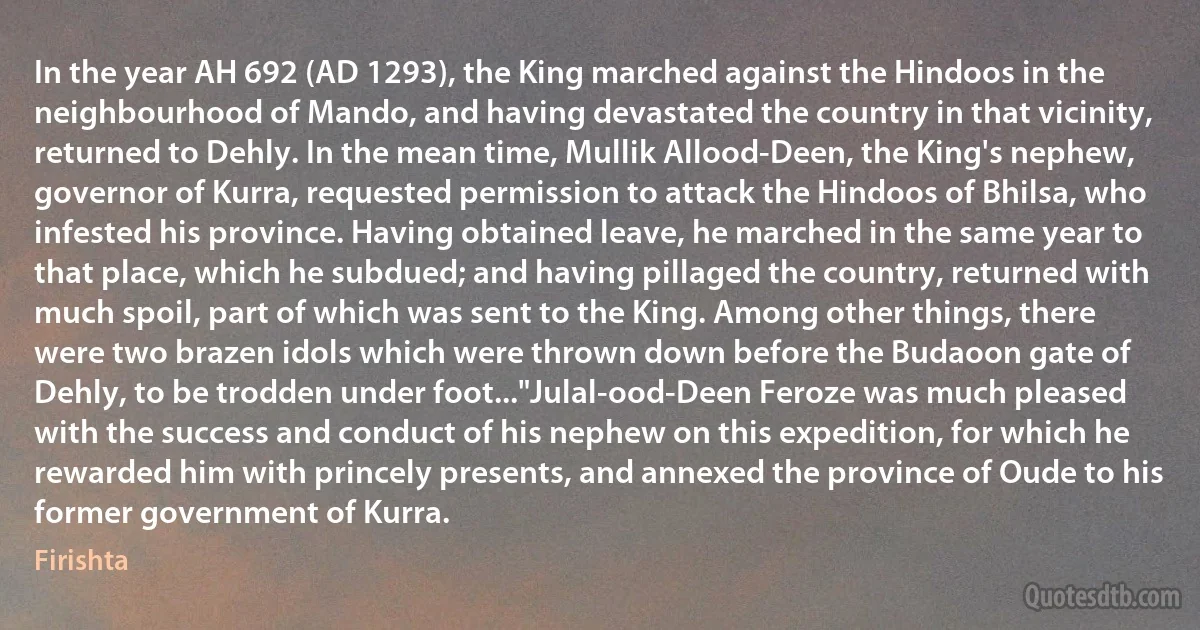
In the year AH 692 (AD 1293), the King marched against the Hindoos in the neighbourhood of Mando, and having devastated the country in that vicinity, returned to Dehly. In the mean time, Mullik Allood-Deen, the King's nephew, governor of Kurra, requested permission to attack the Hindoos of Bhilsa, who infested his province. Having obtained leave, he marched in the same year to that place, which he subdued; and having pillaged the country, returned with much spoil, part of which was sent to the King. Among other things, there were two brazen idols which were thrown down before the Budaoon gate of Dehly, to be trodden under foot..."Julal-ood-Deen Feroze was much pleased with the success and conduct of his nephew on this expedition, for which he rewarded him with princely presents, and annexed the province of Oude to his former government of Kurra.
FirishtaRelated topics
attack conduct country foot gate government having king leave mean place province sent spoil success throw time tread under vicinity year things presentsRelated quotes
Britain for a long time had a reflection of its class structure which meant that people like, well, J. B. S. Haldane who was the nephew of Lord Haldane, or Bertrand Russell who became Lord Russell, could do what they pleased, and it's interesting to think that Bertrand Russell never had a job, he never had to compete for a job. Haldane had four or five different jobs in his life, totally different. He probably could have - if he had been bothered - have just abandoned his job and went on to live otherwise. ... But this no longer exists. IBM no longer exists. I don't see a place now where somebody like myself who combined, let's say, unusual gifts and unusual tastes and, who everybody said has promise, was certainly a misfit of the worst kind could find a position at this point and I think that a tragedy.

Benoît Mandelbrot
I am told that there are still left over 18,000 Hindus and Sikhs in Rawalpindi and 30,000 in the Wah Camp. I will repeat my advice that they should all be prepared to die rather than leave their homes. The art of dying bravely and with honour does not need any special training, save a living faith in God. Then there will be no abductions and no forcible conversions. I know that you are anxious I should go to the Punjab at the earliest moment. I want to do so. But if I failed in Delhi, it is impossible for me to succeed in Pakistan. For I want to go to all the parts and provinces of Pakistan under the protection of no escort save God. I will go as a friend of the Muslims as of others. My life will be at their disposal. I hope that I may cheerfully die at the hands of anyone who chooses to take my life. Then I will have done as I have advised all to do.

Mahatma Gandhi
Don't blame me, Pongo,' said Lord Ickenham, 'if Lady Constance takes her lorgnette to you. God bless my soul, though, you can't compare the lorgnettes of to-day with the ones I used to know as a boy. I remember walking one day in Grosvenor Square with my aunt Brenda and her pug dog Jabberwocky, and a policeman came up and said the latter ought to be wearing a muzzle. My aunt made no verbal reply. She merely whipped her lorgnette from its holster and looked at the man, who gave one choking gasp and fell back against the railings, without a mark on him but with an awful look of horror in his staring eyes, as if he had seen some dreadful sight. A doctor was sent for, and they managed to bring him round, but he was never the same again. He had to leave the Force, and eventually drifted into the grocery business. And that is how Sir Thomas Lipton got his start.

P. G. Wodehouse
My friend returned to the gallery, looked once more at the adorable imprint of the most innocent, the most passionate of caresses. A mirror hung near by, where he could compare his present with his former face, the man he was with the man he had been. He never told me and I never asked what his feelings were at that moment. Did he feel that he was too culpable to have inspired a passion in a young girl whom he would have been a fool, almost a criminal, to marry? Did he comprehend that through his age which was so apparent, it was his youth which this child loved? Did he remember, with a keenness that was all too sad, that other, who had never given him a kiss like that at a time when he might have returned it? I only know that he left the same day, determined never again to see one whom he could no longer love as he had loved the other, with the hope, the purity, the soul of a man of twenty.

Paul Bourget
The chief marched out to meet his enemy, and fought for three days with the Musulmans. On the fourth he fled, and sought to get back into the city; but the Musulmans reached the gate before the fugitives, overpowered them, and disarmed them. A dreadful slaughter ensued, the women were dishonoured, and the property seized. When Bahira saw this destruction, he fled with some trusty followers to the tops of the mountains. Mahmud sent a force in pursuit, which overtook and surrounded the party, and put all the chiefs to the sword. Bahira saw that no hope was left, so he drew a dagger and killed himself. Mahmud remained in Bhdtia until he had settled its affairs, and drawn up rules for its governance. He then returned towards Ghazna, having appointed a representative at Bhatia to instruct the people who had become Muhammadans.

Mahmud of Ghazni
